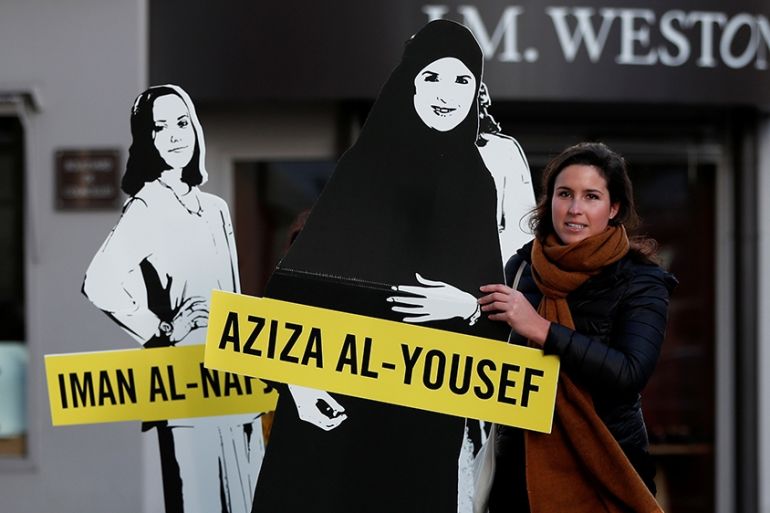House panel advances bill calling for release of Saudi activists
Foreign Affairs panel sends resolution to House that condemns Saudi Arabia’s imprisonment of women’s rights activists.

Washington, DC – A committee of the US House of Representatives has advanced a resolution condemning Saudi Arabia‘s imprisonment of 11 women’s rights activists facing trial for political activism.
The House Foreign Affairs Committee voted to approve and send to the House floor for consideration House Resolution 129 condemning Saudi imprisonment and abuse of female activists.
Keep reading
list of 4 itemsPalestinian Prisoner’s Day: How many are still in Israeli detention?
‘Mama we’re dying’: Only able to hear her kids in Gaza in their final days
Europe pledges to boost aid to Sudan on unwelcome war anniversary
“We must continue to call on the Saudi government to release these women immediately,” said Representative Eliot Engel, Democrat chairman of the House Foreign Affairs Committee.
The resolution is sponsored in the House by Representatives Lois Frankel, a Democrat, and Ann Wagner, a Republican. It was approved by voice vote.
The bill condemns the Saudi government’s imprisonment of women’s rights activists, calls for their release and calls on the Trump administration to impose financial and travel sanctions of Saudi officials under the Global Magnitsky Act, a US human rights law.
“I wanted to give Saudi leadership the benefit of the doubt when we were told there would be great social reform,” said Representative Susan Wild, a Democrat who spoke in support of the measure.
“It has become clear that the Saudi leadership largely seeks to maintain the status quo. That is unacceptable,” Wild said. “We cannot just hold our adversaries accountable for humanitarian abuses. We must also demand accountability of our strategic partners.”
Sexual abuse, torture
Riyadh has faced pressure from Western governments to release the activists, most of whom were detained in May 2018, caught in a wide-ranging crackdown against activists just before the landmark lifting of a decades-long ban on female motorists.
The activists, some of whom have accused interrogators of sexual abuse and torture during nearly a year in custody, face charges that include contact with foreign media, diplomats and human rights groups.
Three of them – activist Aziza al-Yousef, blogger Eman al-Nafjan and preacher Rokaya al-Mohareb – were granted temporary release in late March. Earlier this month, four more detained female activists – Hatoon al-Fassi, Amal al-Harbi, Maysaa al-Manea, and Abeer Namankani – were temporarily released pending trial, according to ALQST, a Saudi rights group based in London.
“These activists have been held as prisoners, and have reportedly faced torture and abuse, including sexual violence, beatings and electric shocks,” Frankel said in a March 12 statement when the resolution was introduced.
“Saudi Arabia must release these advocates and end the discriminatory male guardianship system that restricts women’s decisions about their livelihood,” Frankel added.
Saudi Arabia’s human rights abuses have come under international scrutiny following the October 2018 murder of journalist Jamal Khashoggi at the Saudi consulate in Istanbul.
US intelligence agencies concluded Saudi Crown Prince Mohammed bin Salman had ordered Khashoggi’s killing.
Secretary of State Mike Pompeo said after a meeting with Crown Prince Mohammed in January that he had raised the case of the imprisoned activists with the Saudi leader.
Since then political arrests and executions in Saudi Arabia continue.
Saudi Arabia executed 37 nationals on April 23 for what it said were “terrorism” related crimes, publicly pinning at least one of the bodies to a pole as a warning to others and bringing the number of persons executed this year to 100, according to the Saudi Press Agency.
As many as 13 activists, writers and bloggers who had been placed under a travel ban for their support of women activists, including two dual US-Saudi citizens, were arrested on April 4 and 5, according to ALQST.